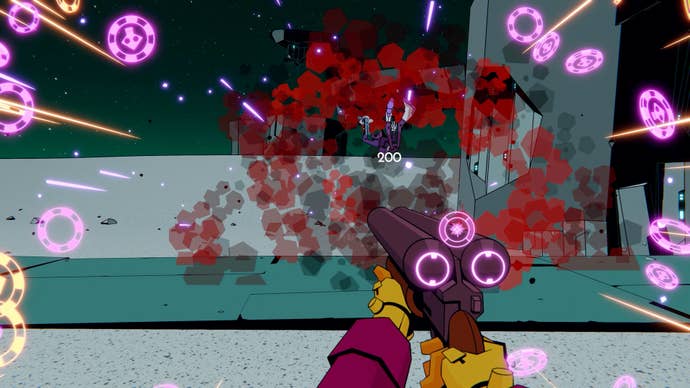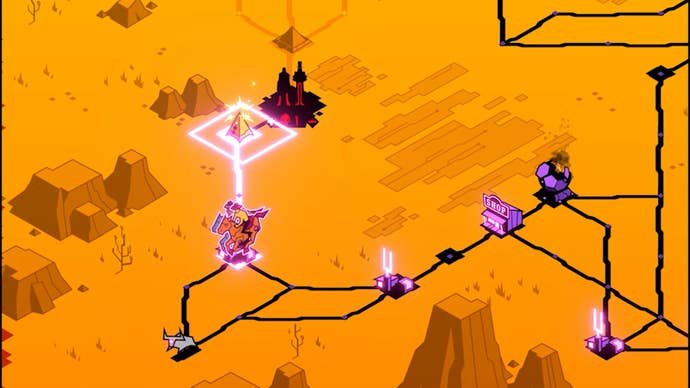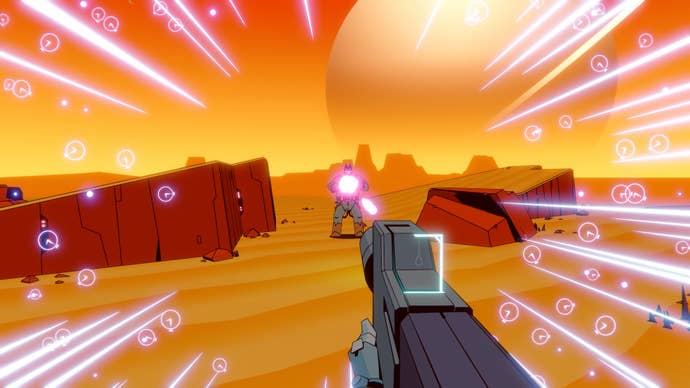Wild Bastards has got killer style and ideas, but feels like a scattered shotgun blast instead of a bullseye
Blue Manchu's latest game takes a while to take off and fails to dazzle.
Blue Manchu's Void Bastards, published back in the day by Humble Games, was a 'strategy-shooter' roguelike I enjoyed enough to grab twice, one DRM-free and another on Steam. More than five years later after its launch, Wild Bastards is taking things in a new direction I haven't been vibing with.
I was really excited to jump into this one. It looked remarkably stylish and breezy, the sort of perfect indie release for the pre-autumn AAA madness period. Unfortunately, my first few hours with it have been middling, and I was wondering whether I wasn't in the right headspace for it, yet some reviews are echoing many of my feelings.
From the get-go, it becomes abundantly clear Wild Bastards is a huge love letter to westerns. "Of course, it basically says so on the cover!" Well, yeah, but you might have the looks and lack the right voice. That ain't an issue here, as Blue Manchu has nailed the banter between characters (as annoying as it can often be) and the atmosphere of a sci-fi setting that borrows all of its skeleton from cowboy and bandits movies. There's even a team of 13 legendary outlaws and enough cliches to stop a train. It wears its influences proudly on its sleeve.
"Faced with their own mortality, the two remaining members have teamed up with the Drifter, a mysterious sentient spacecraft, to find and resurrect the dead gang members as they flee to the mythical Homestead," the game's Steam page reads. It's an enticing enough premise, but problems arise as soon as you launch a new game; the intro feels too rushed and chaotic, like being dropped in the middle of a story that started a long time ago. Of course, this could be adequately cinematic and intriguing (I love me a good in media res start), but it's a decision that simply feels random, and since we're looking at cartoon cutouts and comic strips to get our bearings, it's a bit disorienting.

The info dump about systems, mechanics, and structure isn't more elegant. In fact, the first run's (always a tutorial in roguelike/lite titles) saving grace is that the game itself isn't that complex, so just clicking around during your strategy turns and playing the combat encounter sections like you would in any other FPS are enough to carry you to an early demise due to being unexperienced and underpowered.
Much like Void Bastards, Wild Bastards prides itself in having a 'strategy' layer on top of the actual levels that you play, which means managing a team, their upgrades, and the routes (a la FTL) you're taking to progress and hopefully reach your destination... at some point. For the most part, you'll be clicking through a bunch of menus to decide who are you taking in each adventure, who gets which loot, and the safest (or most profitable) route to your next destination. As always with this type of games, there's a bit of a balancing act involved to come out on top, not just experience, but Wild Bastards (at least on its default, suggested difficulty) feels unfair until you unlock genuinely broken legends.

Poison damage, for example, feels way overtuned, especially with how slow movement is for most characters and how limited their acrobatic skills are. The visuals don't lie: Wild Bastards is as rigid as its 'cardboard cutout' looks suggest. This wouldn't be an issue if the gameplay did something else, but as a stylish shooter (or at least an attempt to create one), it feels far too rigid. The game will push you to use each character's special skills, such as randomly exploding an enemy, to gain an advantage, yet that system simply relies on running aimlessly around the procedurally generated maps to collect as many power-ups as you can to spam those specials. Option B is to slowly walk around and take down your enemies while saving as much HP as possible, which doesn't sound bad on paper.
The thing is that, unlike Void Bastards, Blue Manchu's latest game is built on the idea of going guns blazing, yet the movement and overall flow of encounters actually feels more like Void Bastards, a game that was assembled with stealth and alternatives to combat in mind. Shifting to combat arenas over System Shock-inspired levels to explore wasn't a bad idea per se, but not enough basic elements, such as the controls and the player movement, have been adapted to this central idea. While the strategic layer works well enough and has enough variance to keep me engaged until I roll credits at least once (some ideas like NPC support gangs and nuking roadblocks are fantastic ways to spice things up), I've found myself wishing this was a turn-based game instead or something else.

At least in its pre-launch version, there were also a number of annoyances that I can't believe weren't picked up during testing. For starters, the sound and music are shockingly low no matter the dynamic range that I pick, and effects and dialogues feel like they were spoken in the room next to me. This was apparently a problem in the demo released a while back, and the fact it's still around is baffling. I've also run into enemies that simply died for no reason and suffered key-pressings that weren't registered in the middle of lethal gunfights.
Such issues can be ironed out, and balance passes are bound to happen sooner rather than later, but fixing Wild Bastards' bigger problems simply isn't a possibility. For many, the visual style alone and the interactions between the outlaws will make up for so-so gunplay and movement, or for an overabundance of systems that feel as deep as a tiny puddle. Despite its modest size, Wild Bastards tries to juggle a lot of new ideas without really committing to most nor letting go of old baggage, and with so many more polished and distinct roguelike alternatives in the market right now, I won't be sticking around for much longer in these galactic sectors.

